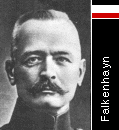Falkenhayn: Difference between revisions
No edit summary |
mNo edit summary |
||
| Line 1: | Line 1: | ||
<p align="right"> [[Main_Page | WWI Document Archive ]] > [[WWI_Biographical_Dictionary|Alphabetical Index of WWI Biographies]] > [[F-Index]] > '''Falkenhayn''' </p><hr> | |||
[[image:MASTHD-C.GIF]] | [[image:MASTHD-C.GIF]] | ||
| Line 14: | Line 17: | ||
<hr> | <hr> | ||
<p align="right"> [[Main_Page | WWI Document Archive ]] > [[WWI_Biographical_Dictionary|Alphabetical Index of WWI Biographies]] > [[F-Index]] > '''Falkenhayn''' </p><hr> | |||
Latest revision as of 17:25, 15 July 2009
WWI Document Archive > Alphabetical Index of WWI Biographies > F-Index > Falkenhayn
Falkenhayn, General Erich von. (1861-1922). Born, Burg Bechau, West Prussia.
Served as a military instructor in China (1899-1903) and was a member of the German staff during the relief expedition to Peking. He was appointed Prussian Minister of War in 1913, where he conflicted with Gen. Helmuth von Moltke (the Younger), but was appointed Chief of Staff by Kaiser Wilhelm II after Moltke's defeat at the Marne. As effective commander-in-chief of German forces in France and Belgium, he consistently attempted to seize the channel coast, but was thwarted by the withdrawal from Antwerp of the Belgian Army, and by the northern deployment of French and British troops which blocked the German 'Race to the Sea'. He commited the mass of German resources to the Eastern front in 1915, at Hindenburg and Ludendorf's insistence, but then was forced to send his reserves to Austria. His belief that the key to the war lay in the dominance of the Western Front caused him to choose Verdun as the point where he must destroy the French Armies. However, whilst the Allies suffered stupendous losses ('were bled white') so also were the Germans, and the French did not break.
Falkenhayn was relieved of command and sent to the Eastern Front on 29 August 1916, before Verdun ended, as commander of the Ninth Army. He repulsed the Roumanians at Sibiu on 30 September, and advanced on Bucharest, joining with Mackensen's army in the middle of November. His troops entered Bucharest on 6 December, and was then sent to command the Turkish forces in Palestine in 1917, where his troops were defeated decisively by General Allenby at Gaza on 31 October and at Junction Station on 13-15 November. He was relieved yet again, by General Otto Liman von Sanders in February, 1918, and retired to Germany.
WWI Document Archive > Alphabetical Index of WWI Biographies > F-Index > Falkenhayn

